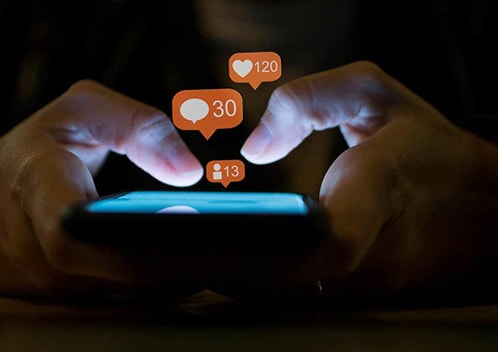When articles and images posted on social networks receive little interaction or few people click the like button, it can lead to symptoms of depression for users.

The information was stated by Mr. Cao Hoang Nam, representative of the Z&Alpha Initiative, when presenting research on the relationship between social networks and mental health on October 4, in Hanoi, on the occasion of World Mental Health Day.World Mental Health.
Vietnam's social media usage time currently ranks 20th in the world, with 73% of the population using social media for an average of 2 hours and 25 minutes per day per person. The top country is Kenya with 3 hours and 43 minutes. Facebook is the most used social media platform in Vietnam, followed by Zalo and TikTok.
Mr. Nam said that social networks have used different algorithms based on in-depth research on the brain's working mechanism to maximize usage time, continuously attract social network users, creating addictive interaction cycles. These features are designed towards teenage users and are not publicly announced to users.
"Social network designs have affected users' psychology," said Mr. Nam, analyzing companies that design like and comment functions, affecting the mechanism of producing endogenous dopamine - a hormone that creates a feeling of comfort and plays an important role in human brain health.
The design of “likes,” “comments,” and social comparisons causes users to constantly check their likes, increasing the frequency of their next posts. When posts have rejections, low engagement, and few “likes,” it can lead to depressive symptoms that increase over time.
According toMedical DailyDepression is a mood disorder characterized by persistent feelings of sadness, loss of interest in previously enjoyed activities, and an inability to complete daily tasks for at least two weeks. Depression is the leading cause of suicide. Each year, about 850,000 people die from this disease, according to statistics from the World Health Organization (WHO). Currently, depression and anxiety disorders are pervasive in Vietnamese society with an estimated nearly 6 million people suffering from the disease, according to statistics in 2022.
In addition, editing personal images before posting on social networks is also related to body dissatisfaction, comparing oneself with society, leading to direct consequences such as anxiety, insecurity, and increased eating disorders. A study of 286 young Vietnamese women aged 18-35 showed that those who frequently edit their images on social networks pay attention to their personal appearance. To change the defects, they can change by physical exercise, dieting, or cosmetic surgery.
Many studies around the world also show that excessive use of social media negatively affects mental health. Research conducted by scientists at the University of Cambridge analyzed data from 84,000 British people aged 10-80, published in 2022, showing that girls aged 11-13 and boys aged 14-15 are the two groups most vulnerable to social media. Girls who used social media from the ages of 11 to 13 were less satisfied with life a year later. This situation repeated for both sexes at the age of 19.
Dr. Nguyen Thi Mai Huong, Institute of Preventive Medicine and Public Health, said that when abusing social networks, adolescents can experience negative impacts, such as sleep disorders, depression, social isolation and internet addiction, cyberbullying. In addition, increased cybercrime rates, peer pressure and exposure to harmful content are some of the risks associated with using social networks, leading to self-harm, suicidal thoughts and other mental health problems.
Experts say it is necessary to develop awareness-raising programs and provide guidance to schools, parents, and users on solutions to protect and improve the mental health of Vietnamese youth in the digital age.
"Equipping ourselves with self-protection skills and maintaining control when using social networks is the key to helping us fully exploit the benefits without negatively affecting the mental health of Vietnamese youth," said Associate Professor, Dr. Le Minh Giang, Director of the Institute of Preventive Medicine and Public Health.
TH (according to VnExpress)